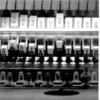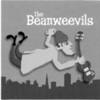Aphex Twin
Drukqs
Warp/Sire
Richard James, the man behind Aphex Twin, composes music to incite a reaction. Ever since debuting in the early 1990s with the moody, groundbreaking Analogue Bubblebath and Selected Ambient Works volumes, James has continued to astound and confound his listeners with music that teeters between playfully childlike and darkly disturbing. Melody, straightforward beat programming, and traditional arrangements are tossed out the window in favor of jarring, often bizarre electronic music that relies on minute tonal shifts, pressure-cooker percussion, frenzied beat patterns, and ethereal, metallic synth textures. Drukqs, comprised of thirty tracks spanning two CDs, is the first new release since James’ supposed “retirement from music” two years ago, and much of the material is as oddly unique as ever. James covers a wide range here, from the tranquil, meditative piano-based tracks reminiscent of his early stuff to pummeling drill-‘n’-bass aural explosions and bizarro future-funk typical of his later years.
Drukqs, while undeniably impressive from a production standpoint, comes off a bit like a purging, as if James pumped it up with several tunes that have been sitting on his hard drive — it could’ve probably been pared down a bit. Yet the album is far superior to a lion’s share of IDM out there. At the very least, Drukqs is a more enjoyable and challenging album than the near-impenetrable works by the like-minded Autechre and Squarepusher. Aphex Twin may be insanity music, but at least there’s a sense of humanity bubbling beneath the baffling technical sheath.
—Tim Pratt
North Mississippi Allstars
51 Phantom
Tone-Cool Records
The North Mississippi Allstars emerged out of the Southern swampland in 2000 with Shake Hands with Shorty, a raw and brilliant debut that fused country blues with rock and a heavy dose of punk attitude. With 51 Phantom, brothers Luther and Cody Dickinson, along with bassist Chris Chew, have put together a formidable, if more polished, followup. Unlike their first album — which featured covers of classics from Mississippi Fred McDowell, Junior Kimbrough, and R.L. Burnside — the group wrote most of these songs themselves, and as a result, the cuts show their diverse influences. Pinning down those influences ain’t easy, though — alternately sounding like ZZ Top, AC/DC, Lynyrd Skynyrd, the Dead, Led Zeppelin, and a gospel ensemble, they slide easily between the down-and-dirty rock of “Sugartown” to the more melodic and gentle “Storm,” then have no problem cranking it up again on songs like “Snakes in My Bushes.” Luther Dickinson’s vocals are weak in the tradition of many fine bluesmen, and it doesn’t matter one bit. He sings and plays some seriously fuzzed-out guitar with great emotion, which is far more important than a five-octave range. Cody Dickinson’s Bonham-like beats add pop even to cleaner tunes like the gospel classic “Freedom Highway” and their own gospel creation “Ship.” But like the mysterious freight train that gives the album its name, the North Mississippi Allstars sound best when running at full steam, as they do with the nasty rockabilly swing of “51 Phantom.”
—Michael Gowan
Rolando Laserie
Mentiras Tuyas
Alma Latina
Miguelito Valdes
Algo Nuevo – Mambo And Rumba Sessions
Tumbao
At the height of the Batista-era Cuban nightclub scene, percussionist Rolando Laserie broke away from his job in the rhythm section of singer Beny More’s band to become a featured vocalist himself. This disc features his early material: smoldering Afro-Cuban sones from 1958-60, in which Laserie soulfully echoes More’s forceful romantic style. Although these tunes were originally written as slow, sappy boleros, in Laserie’s hands they become sizzling, groove-heavy dance tunes. The musicianship is stellar throughout, as Laserie drives his percussionists and horn sections into an uptempo frenzy.
Like many Cuban musicians, Laserie later went on to work in the jazz arena, working with bandleaders such as Tito Puente and Bebo Valdes, but these early recordings reveal him as a dynamic traditional singer at the peak of his powers. A decade earlier, Latin crooner Miguelito Valdes also went hard-edged, plunging into the mambo craze pioneered by Machito and Perez Prado. Valdes began his career in the 1930s as a vocalist for the Orquesta Casino De La Playa — he excelled at slow, corny love songs, and moved to New York to become a featured vocalist in Xavier Cugat’s band. In these late-’40s recordings, Valdes turns the heat up and lets his band loose to play fiery Afro-Cuban dance material. Occasionally he lapses into mere formula, although many tracks do pack real punch. Fans familiar with Valdes’ classic, schmaltzy boleros will be surprised to hear him change gears and really kick out the jams.
–Lawrence Kay
The Beanweevils
The Beanweevils
Weed
This quartet is the Bay Area’s latest addition to the smarty-pants pop-rock pantheon, carrying the torch of irreverence borne by the Donner Party and the Tubes. Like They Might Be Giants and the DP, the Beanweevils infuse their sarcastic, nyaa-nyaa rich songs with insidiously affable tunefulness. But in the Weevils’ case, it’s bubblegum/folk-rock, shiny chiming guitars, and bright ‘n’ breezy summertime boy/girl harmonies. The opener, “Take a Bus,” has the sweetest, catchiest, and most unlikely cheery-pop chorus of the year, consisting of the phrase “that’s a crock of shit.” “Deadhead” takes on the cultural phenomenon of the Bay Area’s affluent slumming youth scene with a loping old-timey country feel and a descending melody à la the Beatles’ “Dear Prudence.” “Notice Me” sets a satire of status into pop nirvana, to wit: a killer ’60s melodic hook that’s a cross betwixt “Hot Fun in the Summertime” and “Crystal Blue Persuasion.” The cheery boy/girl harmonies of Bean and Kelly Amthor (think Cowsills, Partridge Family) belie the tart sarcasm of their lyrics, though sometimes they get more than a bit juvenile (sample gleeful chorus: “Sherry/hairy areola”) and obvious (the lowlife targets of “Strip Club”), but for the most part this is a fine debut that’ll appeal to those who want their jangle-rock shot full of a(n) (un)healthy dose of derision.
—Mark Keresman














